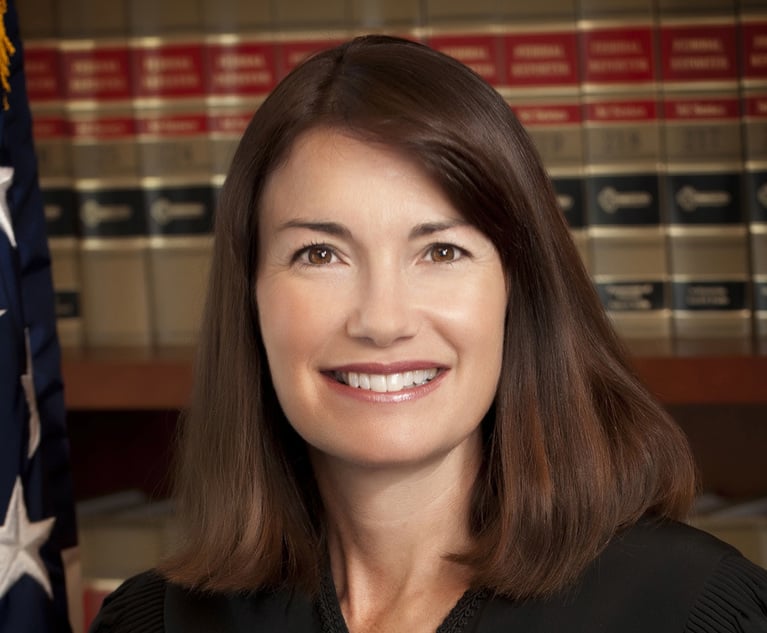Lawyer-Parents Confront Significant Burdens While Homebound by Coronavirus
Summer Eberhard managing director of Major, Lindsey & Africa's Associate Practice Group says the demands of remote working can be intense, and the coming weeks will hold lessons for law firms that go beyond the current crisis.
March 18, 2020 at 11:01 AM
5 minute read
The original version of this story was published on The American Lawyer
 Photo: Shutterstock
Photo: Shutterstock
As the new coronavirus shuts down travel and triggers pleas—and maybe orders—for citizens to stay home, many law firms have shifted to remote work to accommodate both the government's self-isolation recommendations and clients' needs.
But for some attorneys, working from home presents a particular challenge: As schools across the nation close to prevent the spread of the highly contagious virus, lawyers who are also parents suddenly have to juggle the demands of practicing law with full-time child care. And, as studies show that child-rearing and household duties fall mostly to women, female attorneys with kids are disproportionately affected when law firms expect the same schedule when working from home, notes Summer Eberhard, managing director of Major, Lindsey & Africa's Associate Practice Group.
Eberhard, a lawyer-turned-Bay Area and Pacific Northwest recruiter with two young children of her own, spoke with ALM about the unique needs of attorneys with kids during the coronavirus outbreak, and how their law firms can support them.
The shift to remote work has been difficult for everyone, but especially for lawyers with kids. You work with associates, some of whom are parents. How do their needs differ during this time?
I work almost exclusively with Am Law 100 firms and high-end boutiques and their associates, so anywhere from junior associates—2019 grads—all the way through attorneys who may be eight years out of law school. People who have young, elementary school-aged children are about the age of the attorneys I'm working with every day, and with that age, it's even harder. When kids are a little older, you can give them a plan and assignments and they can operate somewhat on their own. It's a much different situation when you're an associate with a 10-month-old or a 3-year-old, which is much more hands-on and you have to be really attentive all day long.
On one hand, you have a generation that's been pushing toward working from home at least on occasion, that's now getting used to doing that on a full-time basis, which can be very isolating and challenging in its own way. Adding in the complexity of having children at home, and it's this extra tension that younger attorneys will be dealing with now.
I'm especially interested in lawyers who are mothers navigating this change.
Mothers will be specifically impacted by this. In their own households, moms tend to be the ones responsible for the children day-to-day. Even if a household has two working parents, the work typically doesn't end up being equitable. That's why it's really important for everyone in the household to have a plan and be able to function both as caretakers and as professionals. Otherwise, this will really impact women professionally—not just now while they're home with their kids, but also responsibilities in the future.
You're an attorney-turned-legal recruiter who is currently working from home with a 10-month old and a 3-year-old. Any strategies you can recommend?
My partner and I have been trading off every three to four hours to watch our kids, and then we have our laptops open in the evening after bedtime. But even relying on your partner, neighbors and family members, managing this situation might mean getting four solid work hours in during the day instead of nine or 10. Many attorneys with small children are not in a position to get a full workday in, which really requires law firms to be more patient and understanding during this transition. That's why flexible time is important. We need to realize that being able to be online for eight to 10 hours straight is really not possible when you have small kids at home. A lot of different stakeholders are going to have to work together to figure this out. Deadlines still have to happen, so communication is key and some responsibilities may have to shift to meet them.
What should firms be doing to support their attorneys with kids when everyone is home?
Being a parent as well as lawyer is not really something people talk about, especially at the associate level. And law firm partners who are in an older generation are a lot more resistant to the idea of telecommuting because they lived in a legal world where face time was incredibly important, both within the firm and with clients. But in today's technological age, that's no longer necessary.
This is a situation that could demonstrate what it looks like to work successfully even when you're not in the office. I think that goes back to communication. Firms and attorneys need to have an open dialogue about what everyone's personal situation is. When everyone is doing that, people are not going to feel alone. At Major, Lindsey & Africa, we have parent groups where we talk about these issues; that needs to happen in law firms, too, and folks in leadership can't assume that when kids are home, their remote-working parents will be able to operate in the same way as when they're in the office, and they need to be OK with it. It really comes from the top down.
You have a lot of firms right now that have taken steps to move toward this environment, as well as firms that haven't. It will be really interesting to see what happens, and I really hope this makes law firms realize they need to start making adjustments and transitions to be more work-from-home friendly and parent friendly, even outside the current crisis.
NOT FOR REPRINT
© 2024 ALM Global, LLC, All Rights Reserved. Request academic re-use from www.copyright.com. All other uses, submit a request to [email protected]. For more information visit Asset & Logo Licensing.
You Might Like
View All

Judge Asks: Should Tom Girardi Serve Sentence in a Medical Facility or Behind Bars?
4 minute read
Trending Stories
- 1Call for Nominations: Elite Trial Lawyers 2025
- 2Senate Judiciary Dems Release Report on Supreme Court Ethics
- 3Senate Confirms Last 2 of Biden's California Judicial Nominees
- 4Morrison & Foerster Doles Out Year-End and Special Bonuses, Raises Base Compensation for Associates
- 5Tom Girardi to Surrender to Federal Authorities on Jan. 7
Who Got The Work
Michael G. Bongiorno, Andrew Scott Dulberg and Elizabeth E. Driscoll from Wilmer Cutler Pickering Hale and Dorr have stepped in to represent Symbotic Inc., an A.I.-enabled technology platform that focuses on increasing supply chain efficiency, and other defendants in a pending shareholder derivative lawsuit. The case, filed Oct. 2 in Massachusetts District Court by the Brown Law Firm on behalf of Stephen Austen, accuses certain officers and directors of misleading investors in regard to Symbotic's potential for margin growth by failing to disclose that the company was not equipped to timely deploy its systems or manage expenses through project delays. The case, assigned to U.S. District Judge Nathaniel M. Gorton, is 1:24-cv-12522, Austen v. Cohen et al.
Who Got The Work
Edmund Polubinski and Marie Killmond of Davis Polk & Wardwell have entered appearances for data platform software development company MongoDB and other defendants in a pending shareholder derivative lawsuit. The action, filed Oct. 7 in New York Southern District Court by the Brown Law Firm, accuses the company's directors and/or officers of falsely expressing confidence in the company’s restructuring of its sales incentive plan and downplaying the severity of decreases in its upfront commitments. The case is 1:24-cv-07594, Roy v. Ittycheria et al.
Who Got The Work
Amy O. Bruchs and Kurt F. Ellison of Michael Best & Friedrich have entered appearances for Epic Systems Corp. in a pending employment discrimination lawsuit. The suit was filed Sept. 7 in Wisconsin Western District Court by Levine Eisberner LLC and Siri & Glimstad on behalf of a project manager who claims that he was wrongfully terminated after applying for a religious exemption to the defendant's COVID-19 vaccine mandate. The case, assigned to U.S. Magistrate Judge Anita Marie Boor, is 3:24-cv-00630, Secker, Nathan v. Epic Systems Corporation.
Who Got The Work
David X. Sullivan, Thomas J. Finn and Gregory A. Hall from McCarter & English have entered appearances for Sunrun Installation Services in a pending civil rights lawsuit. The complaint was filed Sept. 4 in Connecticut District Court by attorney Robert M. Berke on behalf of former employee George Edward Steins, who was arrested and charged with employing an unregistered home improvement salesperson. The complaint alleges that had Sunrun informed the Connecticut Department of Consumer Protection that the plaintiff's employment had ended in 2017 and that he no longer held Sunrun's home improvement contractor license, he would not have been hit with charges, which were dismissed in May 2024. The case, assigned to U.S. District Judge Jeffrey A. Meyer, is 3:24-cv-01423, Steins v. Sunrun, Inc. et al.
Who Got The Work
Greenberg Traurig shareholder Joshua L. Raskin has entered an appearance for boohoo.com UK Ltd. in a pending patent infringement lawsuit. The suit, filed Sept. 3 in Texas Eastern District Court by Rozier Hardt McDonough on behalf of Alto Dynamics, asserts five patents related to an online shopping platform. The case, assigned to U.S. District Judge Rodney Gilstrap, is 2:24-cv-00719, Alto Dynamics, LLC v. boohoo.com UK Limited.
Featured Firms
Law Offices of Gary Martin Hays & Associates, P.C.
(470) 294-1674
Law Offices of Mark E. Salomone
(857) 444-6468
Smith & Hassler
(713) 739-1250







